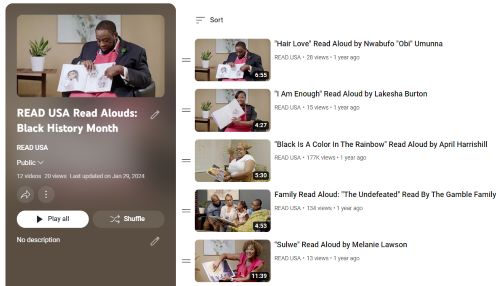This Week at READ USA
Inspire, Educate, and Empower: Diverse Children’s Books for Black History Month
- Read USA Inc.
- February 7 2024
At READ USA, we know that Book Choice is essential to children exploring their curiosity and finding joy in reading – motivating them to read more and continually improve their reading skills – which is why READ USA places such a strong, year-round emphasis on Multicultural Literacy. We also recognize and emphasize the importance of providing children from all backgrounds with books depicting people who look like them.
Dr. Rudine Sims Bishop reminded us that books should be mirrors to reflect ourselves, windows to see others, and sliding glass doors to step into new experiences. When children can access books about people, places, and cultures that represent their own heritage and history, they are more likely to not only read those books, but to connect, be inspired, and want to read even more! Likewise, it is also important for children to read about people, places, and cultures that are different than their own. Black History Month is a time for everyone to celebrate, learn, and read!
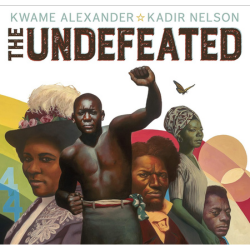
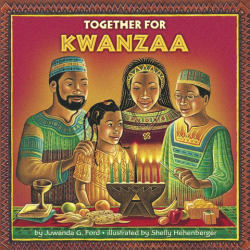
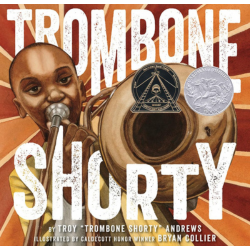
For Black History Month, our team assembled a diverse selection of children’s books that explore a variety of topics related to Black and African American history, people, places, and culture. Check them out below and feel free to share this list with your family and friends who may also be searching for Black History Month children’s books.
Resource: Black History Month Children’s Book Read Alouds
As part of READ USA’s celebration of Black History Month during February, we have created a playlist on our YouTube channel of popular children’s books being read aloud by local African Americans:
These stories – which include titles such as Hair Love, I Am Enough and Black Is A Color In The Rainbow – are sure to inspire younger and older readers alike! Each read aloud offers a chance to celebrate the beauty and depth of the African American experience and the enduring legacy of Black voices.
Do you have a favorite children’s book you’re reading during Black History Month? Let us know on social media!
Thank You, Accelerate!
As a grantee of Accelerate, READ USA had the unique opportunity to gather with other Accelerate grantees last week in Washington, D.C. to discuss the work and impact of high-dosage tutoring.
(To quickly explain: High-dosage tutoring is generally defined as “one-on-one tutoring or tutoring in very small groups at least three times a week,” which is precisely what READ USA’s Literacy Tutoring program has championed in Duval County. Learn more about high-dosage tutoring from Education Week.)
Launched in the context of nationwide student achievement gaps that worsened since the COVID-19 pandemic, Accelerate is a national organization that provides funding for high-impact tutoring programs, supports research, and advocates for policy that advances proven tutoring models. READ USA is grateful to be an Accelerate grantee for our Literacy Tutoring program and to share and learn from our fellow grantees around the nation!
During the Accelerate conference last week, Accelerate shared some key insights about the evidence behind high-dosage tutoring:
- Data is showing that students attending schools in lower-income neighborhoods (typically Title I schools) are a half-year behind where they were in 2019 prior to the COVID-19 pandemic, and the gap is increasing. Higher-income schools are only a quarter-year behind, indicating a profound equity problem. High-dosage tutoring is critical to addressing this issue as evidenced by outcomes. To note, READ USA’s Literacy Tutoring is currently active in 15 schools in Duval County, all of which are Title I schools.
- Teachers and parents are the first educators to influence student growth and progress, and it should be noted that teachers are one part of how our nation reverses the learning gap. This is precisely where high-dosage tutoring comes into the picture. High-dosage tutoring, led and supported by educators, paraprofessionals, philanthropic organizations, nonprofits, and the business community, supports and builds upon what teachers are doing best in their classrooms. READ USA has always believed that “It takes a village,” which was a foundational component in creating our Literacy Tutoring program that uses teen tutors supported by educators to implement reading lessons.
- Metrics and evidence, which Accelerate tracks, indicate that high-dosage tutoring – while originally intended as a “band-aid” to make up for the learning gaps from COVID-19 – is a proven, long-term solution that is helping the education system not only improve outcomes, but also address the impacts of other issues such as teacher shortages and slower learning growth in lower-income schools. READ USA’s results demonstrate this as well.
Thank you to Accelerate for the funding and advocacy work in support of high-dosage tutoring! We are grateful to be on this essential journey with you.
READ USA Participates in United Way Partner Convening
In September 2022, READ USA was honored to be one of 37 community-based programs selected to receive a two-year Economic Mobility Grant from United Way of Northeast Florida. The grants were segmented into four categories – food access, housing stability, education attainment, and workforce development – and READ USA’s Literacy Tutoring was one of 13 programs to receive a portion of $3.6 million in funding focused on increasing opportunities for stable employment. READ USA has been immensely grateful for this investment and trust in our workforce development initiatives and the opportunities we are creating for our READ USA teen tutors!
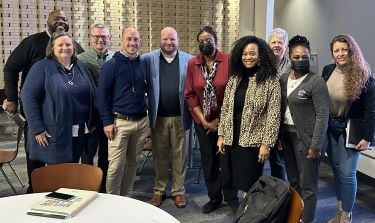
Every quarter, the grantees in each category come together for a Partner Convening to discuss topics pertinent to our areas of funding and hear from our fellow grantees about their latest work. Our Workforce Development group convened last week, and we were thankful to participate in an energetic and highly detailed discussion with fellow grantees about metrics. We shared how READ USA measures and tracks workforce development outcomes, learned about other grantees’ methods, and gleaned some new insights and ideas. Overall, it was a productive and informative gathering and READ USA is grateful to participate!
Many thanks to United Way of Northeast Florida for regularly convening our organizations in focused discussion that ultimately helps all of us enhance our community impact. And thank you to our fellow grantees for the lively discussion and participation!
Children’s Book: Children’s Book: A Library, by Nikki Giovanni
Illustrated by Erin K. Robinson
In this lyrical picture book, world-renowned poet, New York Times bestselling author, and Coretta Scott King Book Award winner Nikki Giovanni and fine artist Erin Robinson craft an ode to the magic of a library as a place not only for knowledge, but also for imagination, exploration, and escape.
A child, with hair in two puffballs tied with yellow ribbons, a blue dress with a Peter Pan collar, and black patent leather Mary Janes, helps Grandmother with the housework, then, at Grandmother’s suggestion, heads to the library. The child’s eagerness to go, with two books under an arm and one in their hand, suggests that this is a favorite destination. The books’ wordless covers emphasize their endless possibilities. The central character’s description of the library makes clear that they are always free to be themselves there—whether they feel happy or sad, whether they’re reading mysteries or recipes, and whether they feel “quick and smart” or “contained and cautious.”
This inspiring read-aloud book includes stunning illustrations and a note from Nikki Giovanni about the importance of libraries in her own childhood. A Library is a love letter to libraries and pays homage to librarians who provide a welcome and a home away from home for all who enter.
Submitted by Kathi Hart, READ USA Content Specialist
Parent Education Corner: Building Background Knowledge with Preschoolers
Background knowledge is crucial for students to fully develop their reading skills. When students use prior knowledge, their brains can create new connections between what they already knew and the new information they are learning. The more background knowledge a student has about a topic, the more deeply they’ll be able to engage with it.
Preschoolers develop background knowledge when parents and family members:
- Show children their own interest and curiosity in the world (e.g., “This book says that crabs and ants have exoskeletons. I’ve never heard that word! Let’s keep reading and see if we can find out what an exoskeleton is!”).
- Use conceptually rich talk that builds children’s knowledge of words and concepts (e.g., “A bat is nocturnal. That means they are active only at night.”).
- Engage children in concrete, meaning-making activities, such as planting a garden and include opportunities to learn important, extended vocabulary—words like “seed,” “cutting,” “bulb,” and “tuber”—and concepts in meaningful ways (e.g., “We need to water the garden today because it has not rained, and plants need water to grow.”).
- Explain unfamiliar words and concepts (e.g., “That window is transparent. ‘Transparent’ means something is clear and you can see right through it!”).
- Connect new knowledge to what children already know (e.g., “Remember how we saw those chickens sitting on their eggs to hatch them…Frogs are different! Frogs lay their eggs in water, and then they swim away!”).
- Answer (or try to answer) children’s questions (e.g., “It does look like the moon is following us, but I am not sure why. Let’s see if we can find out . . .”).
- Ask questions during and after story reading (e.g., “Why do you think the mouse helped the lion? What would you do if you were the mouse?”).
- Ask questions that encourage thinking and reasoning about everyday experiences (e.g., “Why do you think a police siren makes such a loud noise?”) and the natural world (e.g., “How does camouflage keep animals safe?”).
- Explore the sights, sounds, and smells of the local community (e.g., “Do you smell that? I think the bakery is making bread. Let’s follow our noses and see.”).
- Share age-appropriate informational and narrative texts and read parts or all the text depending on children’s interest.
- Encourage children to paint, draw, and “write” to show what they know and what they are interested in.
Submitted by Kathi Hart, READ USA Content Specialist
Do you have any questions or ideas for the Parent Education Corner? Anything you’d like to learn? Let us know here!


